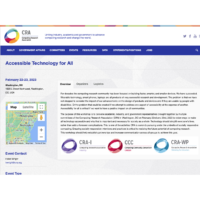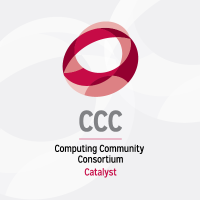CRA Update: Keeping you in the know
Shar Steed, Tracy Camp, and Betsy Bizot made contributions to this article.
In the first installment of the CRA Update: Keeping you in the know column, we began synthesizing feedback received during the opening plenary (“CRA: Looking Forward”) of the 2022 CRA Conference at Snowbird. We finish summarizing the feedback received in this month’s column.
As a reminder, the feedback opportunities were:
- CRA’s new Executive Director Tracy Camp shared her vision for where CRA is headed for both the long- and-short-term, and then asked attendees: “What can/should CRA do for research community members, when we consider different points of one’s career?” The feedback received from this question is summarized below.
- Former CRA Board Chair Ellen Zegura described the strategic planning process and CRA’s current structure and governance, and then asked attendees for ideas on how to modify the board/committee structure and selection process in order to make CRA more effective and more representative of the computing community. Feedback received from this question is summarized in the first CRA Update: Keeping you in the know column.
- CRA’s flagship conference has been held at Snowbird since its inception. While Snowbird is a gorgeous location, some attendees struggle with altitude sickness. Thus, a final opportunity for feedback concerned whether the CRA Conference should be held in different locations moving forward. Feedback received from this question is also summarized in the first CRA Update: Keeping you in the know column.
“What can/should CRA do for research community members, when we consider different points of one’s career?”
During the opening plenary “CRA: Looking Forward”, CRA Executive Director Tracy Camp summarized several ways that computing research community members can currently engage with CRA via two diagrams (below). The diagrams show the different career points (from student to postdoc and then through one’s professional career) where a computing researcher can “stop” and engage with CRA. While the diagrams do not illustrate all of CRA’s programs/activities, they do show many of CRA’s largest activities. For example, consider a new Assistant Professor (Early Career) who is “driving down their road”. Currently they have the opportunity to “stop” at CRA’s Career Mentoring Workshop. The question asked CRA Conference attendees, who brainstormed in small groups, was “where else might CRA consider adding a stop”? In other words, what other career engagement activities (see the “?” stops in the diagram) would further support the careers of computing researchers?

CRA Engagement Opportunities: Student to Postdoc

CRA Engagement Opportunities: Professional Career
There was no shortage of ideas put forward by the CRA Conference attendees! A summary of the nearly 250 responses collected is below. We appreciate the input received and look forward to getting to work on many of them. Stay tuned for details! Lastly, we note that a few of the suggestions received are for activities that CRA already does. We will work to improve our communication of these activities as we move forward.
All stages
- Gather peers, provide networking opportunities, host trainings and workshops
- Train faculty to propose and effectively run undergraduate research experience (REU) programs at scale
- Increase and facilitate academic/industry engagement
- Provide resources and training on topics such as: moving between academia and industry careers, academics in industry, industry professionals in academia, and how to foster collaborations between industry and academia
- Provide templates/norms for joint positions and industry gift agreements to help companies that are new to supporting computing research
- Encourage industry to create research opportunities for undergraduate students
- Engage computing researchers with policy making.
- Provide policy and public engagement training: writing op-eds, other public discussion of research issues
- Increase promotion of CRA’s current activities for research departments and students
- Continue to promote “computing for good”. Make it a fundamental part of education and career development.
- Provide diversity, equity, and inclusion training and more support for underrepresented communities
- Broaden CRA member departments and engage smaller universities in activities
- Continue writing/distributing Best Practice documents for the community
Students
- Encourage domestic students to pursue PhD programs
- Increase student awareness of graduate school options and financial support
- Show career pathways to inspire early undergraduates
- Support “on ramps” to research
- Share information on: What is research? How to get involved in an REU?, How to apply to graduate school?
- Develop a program that mentors undergraduates minoritized in tech and nontraditional students in creating strong PhD applications in order to help diversity the applicant pool
- Engage with high school students
- Help PhD students in career pathway selection
- Provide training on how to prepare for and write a strong diversity statement for a faculty application
- Offer career options and job search workshops for PhD students
- Provide training for faculty that focuses on inclusivity
Early Career
- Provide training for leading research teams
- Increase mentoring opportunities for junior faculty
- Develop training and resources for teaching faculty
- Create resources for junior faculty to help write grant proposals
Mid-Career
- Provide training on how to be a good advisor and effective mentor
- Provide training on how to communicate and work with people from other disciplines, especially those from humanities and social sciences
- Host a mid- career workshop focused on topics such as promotion to full professor, pros and cons of administration, growing into leadership roles in the department, and possible other career directions after promotion
Senior Career
- Provide additional training and resources for those in the early years of their department chair role
- Encourage peer mentoring for new chairs
- Create training for new deans (which is needed as more colleges of computing are created)
Retirement
- Provide low-time commitment activities that harness wisdom of retired individuals and keep them active in the field post-retirement
- Provide opportunities for retirees to mentor early/mid career professionals
- Ask retired individuals (especially in industry) to provide training and resources for non-retired computing researchers



